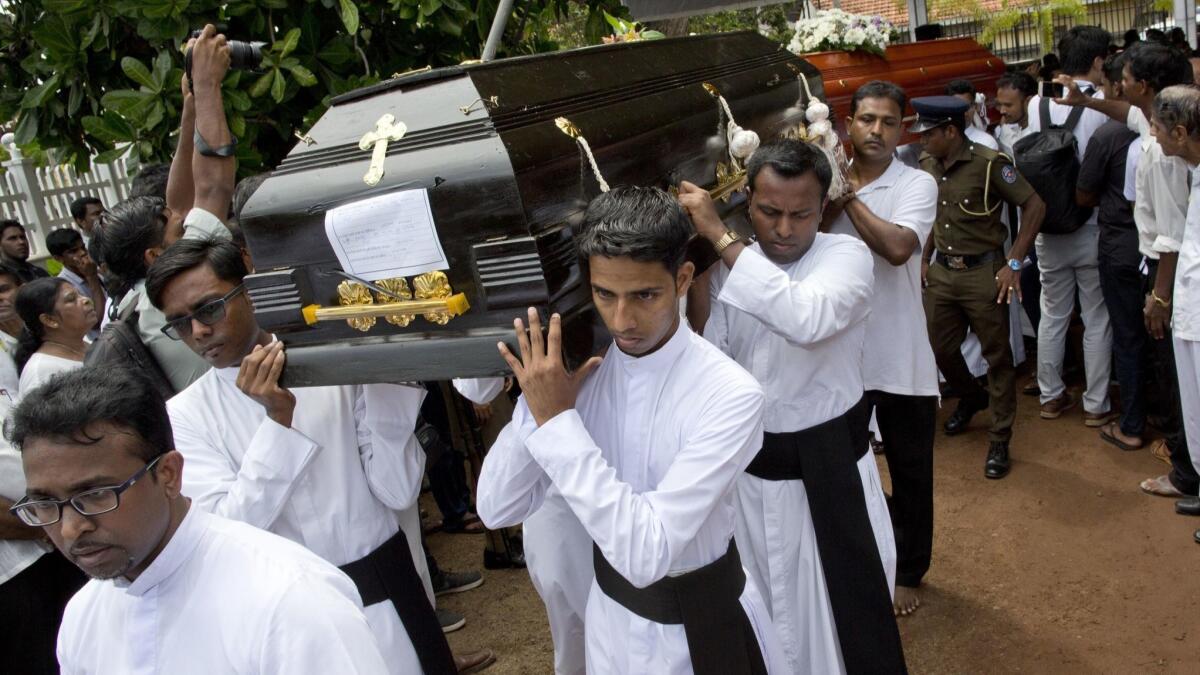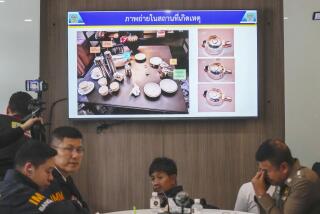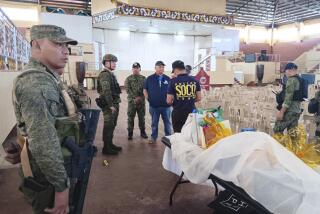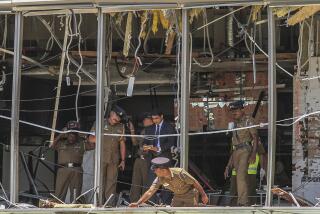Islamic State takes responsibility for Sri Lanka Easter bombings as churches bury their dead

- Share via
Reporting from Colombo, Sri Lanka — The men who rented the green, four-room bungalow along a quiet lane in a Colombo suburb took pains to avoid their neighbors. They ordered takeout, never went to the local mosque and only ventured outside in a white Suzuki sedan, its windows heavily tinted.
They drove off for the last time around 7:20 a.m. Sunday, recalled Riaz Mohammed, who lives next door. Barely an hour later, according to police, one of the men blew himself up in the restaurant of the Shangri-La hotel as part of a wave of Easter suicide bombings across Sri Lanka.
Islamic State said Tuesday that the attackers — at least two of whom are believed to have lived in the rented safe house — were its fighters. In a statement issued by its Amaq news agency, the extremist group claimed responsibility for the coordinated blasts against churches and luxury hotels. It said the targets were “infidels” and “citizens of the crusader alliance.”
The death toll rose Tuesday to 321, including at least 38 foreigners, in what would be one of the extremist group’s deadliest attacks outside its former strongholds of Iraq and Syria.
The claim by Islamic State, more than 48 hours after the first bombings shook this island nation off the southern coast of India, appeared to support the Sri Lankan government’s contention that the assailants — including seven suicide bombers — were domestic extremists who acted with support from international terror networks.
As usual, the extent of Islamic State’s involvement could not be verified; the group routinely claims attackers who support its brutal ideology as its own, even if it doesn’t participate in their plots.
Junior Defense Minister Ruwan Wijewardene told Parliament that the initial investigation — which is believed to include information gleaned from 40 suspects arrested in the attacks — had determined the bombings were “carried out in response” to shooting attacks on March 15 at two mosques in Christchurch, New Zealand, that left 50 people dead.
But terror experts argued that National Thowheeth Jamaath, the Sri Lankan extremist group that the government accused of supplying the bombers, could not have planned and executed such a well coordinated attack in so little time.
Jonah Blank, a political scientist who covers counterterrorism and Asian affairs at the Rand Corp., said it was “highly unlikely” that the Sri Lanka attacks — which follow the Islamic State playbook of attacking houses of worship — were linked to those by a white supremacist gunman in New Zealand.
“The bombings in Sri Lanka were highly complex and extremely sophisticated,” Blank said. “Operations like these typically take far longer to plan and arrange than the five weeks since the Christchurch bombings.”
Sri Lanka’s unstable coalition government is under pressure to show progress in the investigation, particularly after some ministers accused President Maithripala Sirisena — and the intelligence and security officials he oversees — of failing to act on information from foreign allies, including India, indicating a possible terrorist plot.
In a televised speech, Sirisena turned the blame on security agencies and said he had not been informed of any threat.
“They have failed in their responsibility and action will be taken against those who are responsible,” he said, pledging to remove some officials within 24 hours. “If I received information, I would have taken necessary steps to address it.”
Notably, Sirisena made no mention of the alleged Christchurch connection.
Blank said the New Zealand claim could be “misdirection” by the suspects. He said it was plausible that the assailants received direct operational support from militants experienced in plotting and executing terror attacks.
Nothing in National Thowheeth Jamaath’s short history — which has included publishing hate speech online and vandalizing icons of Buddhism, Sri Lanka’s predominant religion — indicated they were capable of carrying out such a plot.
Neighbors in Paratta, the sleepy neighborhood south of Colombo where the safe house was located, said the men had arrived in February — weeks before the New Zealand mosque shootings. For nearly two months, they worked undetected, assembling bombs that proved devastatingly successful, police said.
The house is now ringed by police tape, and officers have kept watch in 10-hour shifts nonstop since raiding the property on Sunday afternoon. Through the sliding wooden gate sat the empty driveway where the suspects used to park their Suzuki sedan.
Much of the house was empty, its contents having been carted away by investigators who found equipment to make explosive devices and suicide vests, including ball bearings, gunpowder, chemicals and detonators, as well as pieces of mobile phones and SIM cards, officers said.
They uncovered nothing to conclude that the occupants were foreigners or working with foreign extremist groups, said Induka De Silva, a police inspector. But he was impressed with their planning.
“They did their research and found a quiet place,” De Silva said.
The house sits in a largely Muslim neighborhood, down a lane of modest houses hidden behind gates. The only sounds on Tuesday afternoon were the occasional scooter and clucks of chickens.
Riaz Mohammed, a paint shop employee who lives next door with his wife and their three children, said at first the two men in their mid-30s were accompanied by women and children, but that they left the men after a few days.
Mohammed and his wife never spoke to the men, but he overheard them conversing with one another in Tamil, a Sri Lankan language. In the evenings they turned the volume on the TV way up, perhaps to mask other sounds in the house.
“They never set foot on the street,” he said, “not even to throw out their trash.”
Police said the men had rented the house online for about $230 per month from an out-of-town landlord, who has since been arrested. Investigators say they do not believe he had knowledge of the plot.
As the probe widens, Sirisena on Tuesday imposed a partial state of emergency to give law enforcement agencies the power to detain and question people without warrants. Some social media sites including Facebook and WhatsApp remained blocked for most users for a third consecutive day, to inhibit the spread of rumors and hate speech.
Tempers ran high in Negombo, the majority Catholic town north of Colombo that saw the greatest number of casualties — 108 congregants killed during Easter Mass at St. Sebastian’s church, Catholic leaders said. The other suicide bombings targeted a Catholic church in Colombo, a Protestant church in the eastern city of Batticaloa and three five-star hotels in central Colombo.
So many bodies had to be buried in Negombo that a new cemetery was dug Monday on a patch of land behind St. Sebastian’s church, whose damaged tile roof was half-covered with tarp and wreckage of pews lay strewn about.
Tombstones couldn’t be made in time, so temporary wooden crosses marked the burial spots, each bearing a number printed by hand.
After a nationwide moment of silence at 8:30 a.m., to mark the time of the first bombing, the coffins began coming — topped with flowers and carried by ashen pallbearers to the burial ground, where cemetery workers dug and dug to create enough graves to accommodate the bodies.
“We buried about 25 people today,” said Father Nishanta Cooray of Kandy in central Sri Lanka, who arrived in Negombo hours after the attack to assist church leaders. “And there are so many more to go.”
Times staff writer Nabih Bulos in Beirut, Lebanon, and special correspondent Munza Mushtaq in Colombo contributed to this report.
More to Read
Sign up for Essential California
The most important California stories and recommendations in your inbox every morning.
You may occasionally receive promotional content from the Los Angeles Times.











